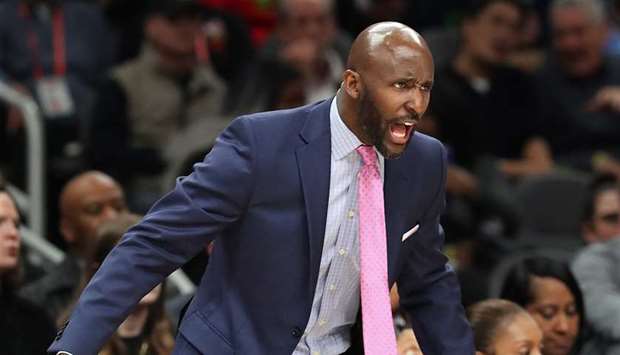NBA coaches are taking a stand. Hawks coach Lloyd Pierce last week spoke out against racism and the case of George Floyd, who died May 25 after a Minneapolis police officer was recorded pressing his knee onto Floyd’s neck as he lay on the ground in handcuffs for nearly nine minutes. The officer, Derek Chauvin, has since been charged.
When Pierce shared his thoughts, he mentioned that it was about more than words and expressing emotion — it’s about taking action to address the issue.
As a member of a seven-person committee that the National Basketball Coaches Association created to discuss issues of race and solutions to injustice, Pierce, who volunteers with the Georgia Innocence Project and is passionate about using his platform to help others, is doing just that.
The committee met for the first time Saturday, met again Sunday and will meet again Tuesday, Pierce said. When it comes to what action they’ll take and suggest, they’re focusing on what is sustainable.
“The action is the challenging part, because there’s so many things you want to try and cover and so many things that are presented, and ideas,” Pierce said. “But the word we’re throwing out is ‘sustainable.’ What’s going to be sustainable, what’s going to have a lasting impact?”
Monday morning, the NBCA released a statement on Floyd’s death. The statement was signed by all 30 current NBA head coaches and three former ones, and more than 100 assistant coaches. It begins with heartfelt condolences and prayers for Floyd’s family and continues: “As NBA coaches — both head and assistant coaches — we lead groups of men, most of whom are African American, and we see, hear and share their feelings of disgust, frustration, helplessness and anger,” the statement read. “The events of the past few weeks — police brutality, racial profiling and the weaponisation of racism are shameful, inhumane and intolerable.
“As a diverse group of leaders, we have a responsibility to stand up and speak out for those who don’t have a voice — and to stand up and speak out for those who don’t feel it is safe to do so. Witnessing the murder of George Floyd in cold blood and in broad daylight has traumatised our nation, but the reality is that African Americans are targeted and victimised on a daily basis. As NBA coaches, we cannot treat this as an isolated incident of outrage.
“We are committed to working in our NBA cities with local leaders, officials and law enforcement agencies to create positive change in our communities. We have the power and platform to affect change, and we will use it.”
According to ESPN, Pierce is joined by Spurs coach Gregg Popovich, Warriors coach Steve Kerr, Cavaliers coach JB Bickerstaff, Jazz coach Quin Snyder, former Knicks and Grizzlies coach David Fizdale and former Pistons, Magic and Heat coach Stan Van Gundy. The committee has discussed “a ton” of ideas, Pierce said, but they’re still in the early stages of brainstorming. “I don’t know what is going to be attainable, I don’t know what’s going to be practical, whether it’s the NAACP or getting the Innocence Project involved, or getting some politicians that have been working on policy change involved,” Pierce said. “The word ‘sustainable’ is so important for us because it isn’t just a conversation we need to keep having, we do need to get into action. How do we better engage law enforcement?”
Having conversations and NBA coaches show unity is one of the first small steps, Pierce added, but a more concrete plan is to come. It’s about what change can occur even after protests around the nation, including in Atlanta, come to a stop.
“It’s tough, because I don’t know the answers to the systemic change that we need and we’re all striving for,” Pierce said. “I do know it’s going to require appropriate education, it’s going to require more work than we’re seeing with the protesting by the individuals. I think the emotional side is now. The effort and the work ethic and everything that’s required to actually impact and create change is, what’s going to happen when the protest goes away? That’s education, as a young person. This isn’t taught in school. Systemic racism isn’t taught in school. There’s no class on this.”

Atlanta Hawks head coach Lloyd Pierce. (TNS)
